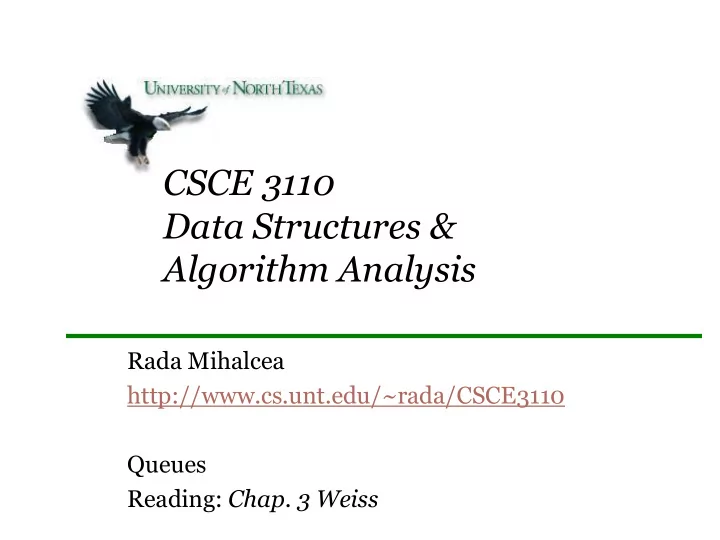

CSCE 3110 Data Structures & Algorithm Analysis Rada Mihalcea http://www.cs.unt.edu/~rada/CSCE3110 Queues Reading: Chap. 3 Weiss
Queue Stores a set of elements in a particular order Stack principle: FIRST IN FIRST OUT = FIFO It means: the first element inserted is the first one to be removed Example The first one in line is the first one to be served
Queue Applications Real life examples Waiting in line Waiting on hold for tech support Applications related to Computer Science Threads Job scheduling (e.g. Round-Robin algorithm for CPU allocation)
First In First Out rear D rear D rear C C rear C B B B rear front front B front front A A A A front
Applications: Job Scheduling front rear Q[0] Q[1] Q[2] Q[3] Comments -1 -1 queue is empty -1 0 J1 Job 1 is added -1 1 J1 J2 Job 2 is added -1 2 J1 J2 J3 Job 3 is added 0 2 J2 J3 Job 1 is deleted 1 2 J3 Job 2 is deleted
Queue ADT object: a finite ordered list with zero or more elements. Methods or Functions: Queue createQ( max_queue_size ) ::= create an empty queue whose maximum size is max_queue_size Boolean isFullQ( queue, max_queue_size ) ::= if (number of elements in queue == max_queue_size ) return TRUE else return FALSE Queue Enqueue( queue, item ) ::= if (IsFullQ( queue)) queue_full else insert item at rear of queue and return queue
Queue ADT (cont’d) Boolean isEmptyQ( queue ) ::= if ( queue ==CreateQ( max_queue_size )) return TRUE else return FALSE Element dequeue( queue ) ::= if (IsEmptyQ( queue )) return else remove and return the item at front of queue.
Array-based Queue Implementation As with the array-based stack implementation, the array is of fixed size A queue of maximum N elements Slightly more complicated Need to maintain track of both front and rear Implementation 1 Implementation 2
Implementation 1: createQ, isEmptyQ, isFullQ Queue createQ( max_queue_size ) ::= # define MAX_QUEUE_SIZE 100/* Maximum queue size */ typedef struct { int key; /* other fields */ } element; element queue[MAX_QUEUE_SIZE]; int rear = -1; int front = -1; Boolean isEmpty(queue) ::= front == rear Boolean isFullQ(queue) ::= rear == MAX_QUEUE_SIZE-1
Implementation 1: enqueue void enqueue(int rear, element item) { /* add an item to the queue */ if (rear == MAX_QUEUE_SIZE-1) { queue_full( ); return; } queue [++rear] = item; }
Implementation 1: dequeue element dequeue(int front, int rear) { /* remove element at the front of the queue */ if ( front == rear) return queue_empty( ); /* return an error key */ return queue [++ front]; }
Implementation 2: Wrapped Configuration EMPTY QUEUE [3] [2] [3] [2] J2 J3 [1] [4] [1] [4] J1 [0] [5] [0] [5] front = 0 front = 0 rear = 0 rear = 3 Can be seen as a circular queue
Leave one empty space when queue is full Why? FULL QUEUE FULL QUEUE [2] [3] [2] [3] J8 J9 J2 J3 J7 [1] [4][1] [4] J1 J4 J6 J5 J5 [0] [5] [0] [5] front =0 front =4 rear = 5 rear =3 How to test when queue is empty? How to test when queue is full?
Enqueue in a Circular Queue void enqueue(int front, int rear, element item) { /* add an item to the queue */ rear = (rear +1) % MAX_QUEUE_SIZE; if (front == rear) /* reset rear and print error */ return; } queue[rear] = item; }
Dequeue from Circular Queue element dequeue(int front, int rear) { element item; /* remove front element from the queue and put it in item */ if (front == rear) return queue_empty( ); /* queue_empty returns an error key */ front = (front+1) % MAX_QUEUE_SIZE; return queue[front]; }
List-based Queue Implementation: Enqueue void enqueue(pnode front, pnode rear, element item) { /* add an element to the rear of the queue */ pnode temp = (pnode) malloc(sizeof (queue)); if (IS_FULL(temp)) { fprintf(stderr , “ The memory is full \ n”); exit(1); } temp->item = item; temp->next= NULL; if (front) { (rear) -> next= temp;} else {front = temp; rear = temp; }
Dequeue element dequeue(pnode front) { /* delete an element from the queue */ pnode temp = front; element item; if (IS_EMPTY(front)) { fprintf(stderr, “The queue is empty \ n”); exit(1); } item = temp->item; front = temp->next; free(temp); return item; }
Algorithm Analysis enqueue O(?) dequeue O(?) size O(?) isEmpty O(?) isFull O(?) What if I want the first element to be always at Q[0] ?
Recommend
More recommend